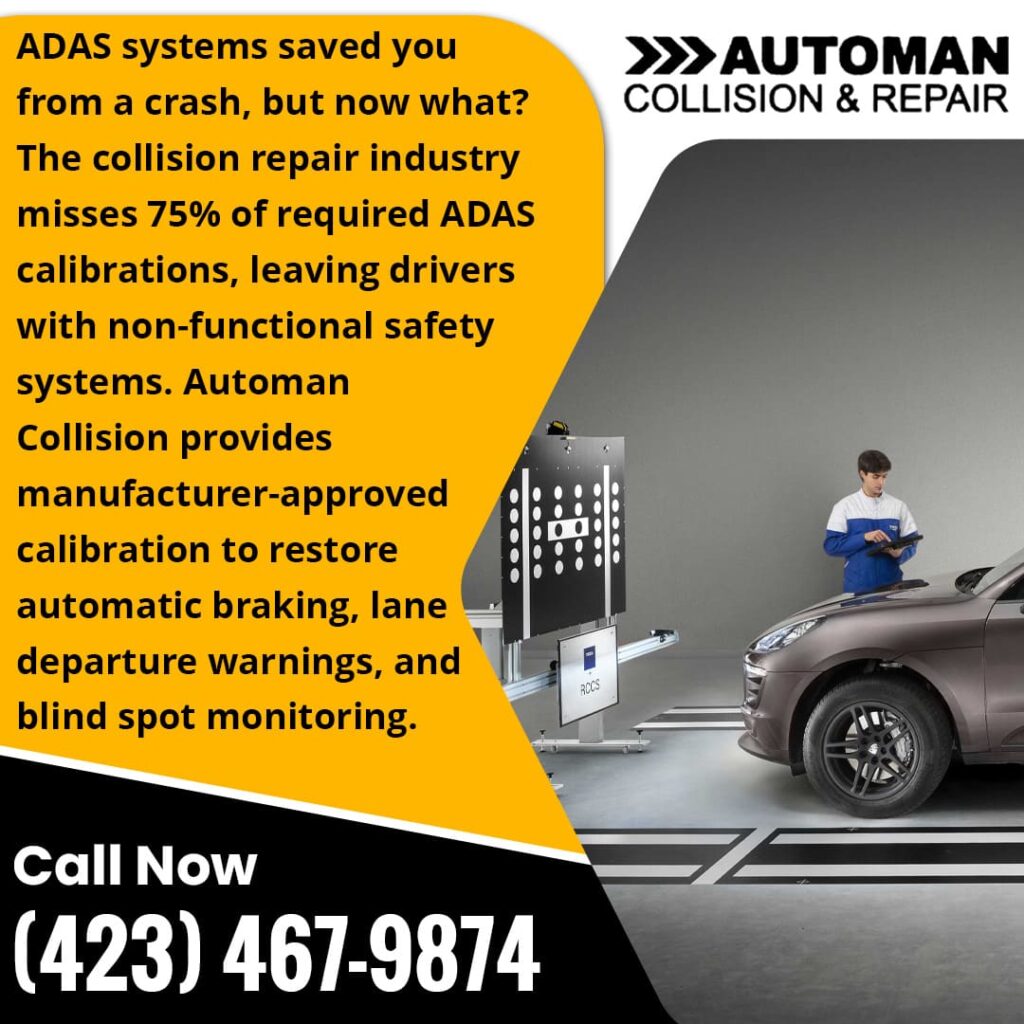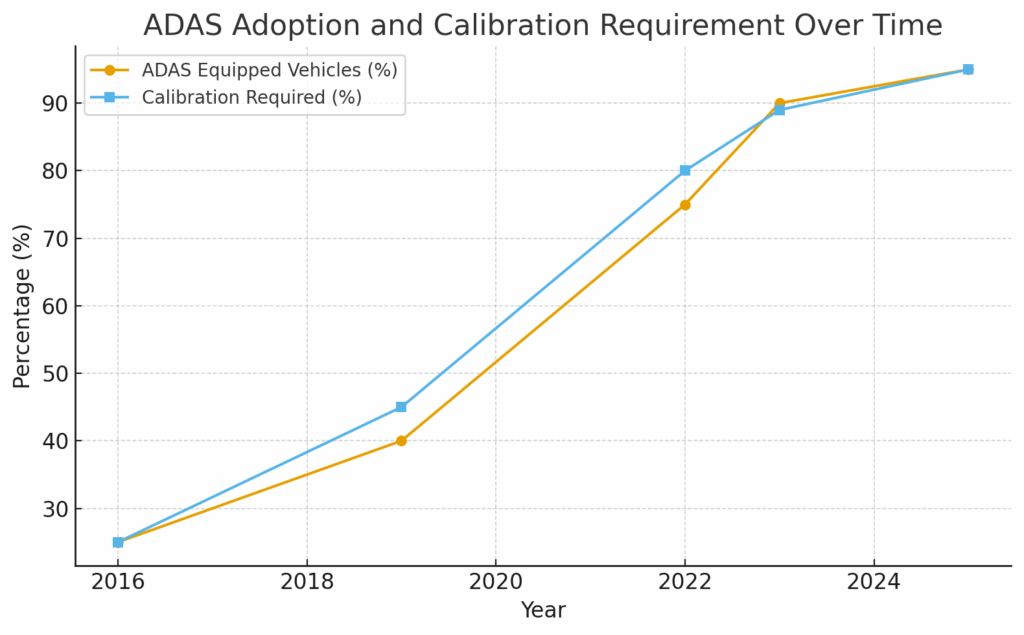Your ADAS system prevented a major accident. However, the collision damaged sensors and cameras that required professional recalibration to function safely. Without proper calibration at an auto body shop in Johnson City, TN, these life-saving systems may fail when you need them most.
Advanced Driver Assistance Systems (ADAS) have transformed vehicle safety. These systems use cameras, radar, and sensors to prevent crashes through features like automatic emergency braking and lane departure warnings. When your ADAS saves you from a serious accident, the minor collision that follows still affects these delicate systems. At Automan Collision & Repair, we provide reliable auto body repair in Johnson City, TN, to restore both appearance and advanced safety functions.
Key Takeaways
- ADAS calibration is necessary after a collision to maintain the accuracy of sensors and cameras.
- Repair costs increase when ADAS components require realignment or replacement.
- Missed calibrations create safety risks, as systems may not work as intended after repairs.
- Automan Collision & Repair, a trusted auto body shop in Johnson City, TN, provides precise calibration and quality auto body.
- ADAS technology is now common in most modern vehicles, making professional calibration more important than ever.

Why ADAS Calibration Is Critical After Any Collision
ADAS sensors require precise alignment within 0.6 degrees to function correctly. Even minor collisions can shift these components enough to reduce effectiveness by 60%. According to industry experts, a camera misaligned by just 0.6 degrees can reduce braking reaction times by 60%, decreasing the time from 1.5 seconds to just 0.9 seconds.
- Modern vehicles depend on multiple ADAS components working together. Front-facing cameras mounted near windshields monitor lane markings and detect obstacles.
- Radar sensors in bumpers track vehicle distances for adaptive cruise control.
- Side-mounted sensors enable blind spot monitoring. When any component shifts during impact, the entire system’s accuracy suffers.
The collision repair industry currently misses many of the required ADAS calibrations. This creates a dangerous situation where drivers believe their safety systems work properly when they don’t. According to market research, the industry is missing about 75% of the calibrations that are needed on average, and there’s also a 75% comeback ratio with cars with ADAS.
Understanding ADAS Technology in Your Vehicle
ADAS combines cameras, radar, lidar, and ultrasonic sensors to create a complete safety network around your vehicle. Each component serves specific functions that require exact positioning to operate effectively.
Forward-facing cameras handle multiple safety features. These cameras enable automatic emergency braking by detecting obstacles ahead. Lane departure warning systems use the same cameras to identify lane markings. Forward collision warning relies on camera data to alert drivers of potential impacts.
Radar sensors typically mount on the front and rear bumpers. Front radar enables adaptive cruise control by maintaining safe following distances. These sensors also support automatic emergency braking systems. Rear radar sensors enable blind spot monitoring and rear cross-traffic alerts.
Ultrasonic sensors usually appear in bumpers for parking assistance. These sensors measure distances to nearby objects during low-speed maneuvers. Some systems create 360-degree views by combining multiple camera feeds.
When to Choose Professional Auto Body Repair in Johnson City, TN
Not all collision repairs trigger ADAS calibration requirements, but certified auto body technicians in Johnson City can identify when calibration becomes necessary. Understanding these specific situations helps vehicle owners make informed decisions about their repair needs.
ADAS systems require recalibration whenever sensors experience physical displacement. Front-end collisions often damage radar sensors mounted in bumpers. Side impacts can affect blind spot monitoring sensors. Even rear-end collisions may shift cameras mounted near windshields.
Windshield replacement represents the most common calibration trigger. 89% of model-year 2023+ vehicles will require a calibration following a windshield replacement, up sharply from only 25% of model-year 2016 vehicles. Forward-facing cameras mount directly to windshields, making replacement a calibration requirement.
Collision repairs require calibration even when ADAS components appear undamaged. Impact forces can shift sensor mounting points slightly. Bumper repairs, body panel replacement, and structural work all potentially affect sensor alignment.
Routine maintenance procedures also trigger calibration needs. Wheel alignments change vehicle geometry enough to affect some ADAS systems. Suspension work alters ride height, impacting sensor angles. Tire size changes modify the vehicle’s relationship to road surfaces.
The Professional ADAS Calibration Process
ADAS calibration involves two distinct methods: static calibration performed in controlled shop environments and dynamic calibration completed through test drives. Both approaches require specialized equipment and trained technicians.
Static calibration takes place in repair facilities using precise positioning targets. Technicians position vehicles on level surfaces at exact distances from calibration targets. Specialized software guides the calibration process according to manufacturer specifications. This method works for most camera-based systems and some radar applications.
Dynamic calibration requires driving the vehicle under specific conditions. Technicians drive predetermined routes at specified speeds while ADAS systems learn from real-world conditions. Lane departure systems need road markings to establish baseline references. Adaptive cruise control requires highway driving to calibrate radar sensors.
Cost Implications of ADAS Repairs
ADAS-related repairs add 13% to 40% to total collision repair costs, with individual calibrations ranging from $350 to $600. These expenses reflect the sophisticated technology and specialized skills required.
The average cost of replacing ADAS components in a minor front collision repair was $1,540, or 13.2% of the average total repair. Rear collision ADAS repairs average $684, representing 40.9% of total repair costs. Side mirror replacement with blind spot monitoring can exceed 30% of repair expenses.
| Repair Type | ADAS Component Cost | Percentage of Total Repair |
| Front Collision | $1,540 average | 13.20% |
| Rear Collision | $684 average | 40.90% |
| Side Mirror | $1,596 maximum | 30%+ |
| Windshield | $360 average | 25.40% |
Individual component replacement varies significantly. Front radar sensors cost $500 to $1,300. Front camera sensors range from $600 to $800. Calibration services add $350 to $600 per session, depending on complexity and manufacturer requirements.
Choosing the Right Local Auto Body Repair in Johnson City
Selecting an auto body shop in Johnson City, TN, with ADAS calibration capabilities protects your investment and safety. Not all repair facilities possess the equipment, training, or expertise required for accurate calibration.
Automan Collision & Repair LLC maintains I-CAR Gold-Class certification, demonstrating our certified auto body technicians in Johnson City meet industry training standards. Our facility houses manufacturer-approved calibration equipment for major automotive brands. We follow OEM procedures exactly, providing local auto body repair in Johnson City that restores your ADAS systems to factory specifications.
Our team handles insurance coordination, reducing stress during the process of auto body repair in Johnson City, TN. We work with all insurance providers and understand ADAS calibration coverage requirements. Free estimates provide transparent pricing before work begins at our local auto body repair in Johnson City facility.
Customer Reviews:
- “Worth every penny. They went above and beyond to smooth out the details with the insurance company. Consistent communication during the repair process. Our Subaru looks amazing.” – Joe D., Local Guide
- “The staff were super helpful and friendly throughout the whole process. They got my car in and out, and provided me with all the information and details I needed. They took great care of my car and she came out looking flawless once more!” – Emma Tubul.
ADAS Technology Trends and Future Considerations
Modern vehicles increasingly rely on ADAS features. According to industry data, with 90%+ of new vehicles rolling off production lines equipped with at least one ADAS feature, calibration requirements will only expand. Autonomous vehicle development accelerates this trend.
Electric vehicles introduce additional complexity. High-voltage systems require specialized safety protocols during repair and calibration. Lithium battery placement affects sensor mounting locations and calibration procedures.
Software updates complicate the calibration landscape. Over-the-air updates can change ADAS parameters, potentially requiring recalibration. Repair facilities must stay current with manufacturer technical bulletins and software versions.
ADAS Adoption Rates and Calibration Requirements

This data shows the rapid increase in both ADAS adoption and calibration requirements, highlighting the growing importance of proper calibration services.
Protecting Your Investment and Safety
ADAS calibration protects both your safety and your vehicle’s value. Properly calibrated systems reduce accident risk and maintain manufacturer warranty coverage.
Insurance companies increasingly recognize ADAS effectiveness. According to industry insights, vehicles equipped with FCW and AEB have 50% fewer front-to-rear crashes. Some insurers offer discounts for cars with properly functioning ADAS systems.
Resale value depends on working safety systems. Buyers expect ADAS features to function correctly. Documentation of proper calibration following repairs maintains vehicle value and provides peace of mind for future owners.
Take Action: Schedule Your ADAS Calibration
Don’t compromise your safety with improperly calibrated ADAS systems. Contact our auto body shop in Johnson City, TN, for professional ADAS calibration services. Our certified auto body technicians in Johnson City use manufacturer-approved equipment to restore your vehicle’s safety systems through proficient auto body repair in Johnson City, TN.
Why Choose Automan Collision & Repair for ADAS Calibration?
Over 30 years of automotive repair experience combined with modern ADAS skills. Our I-CAR Gold-Class certified technicians stay current with evolving technology. We serve Johnson City, TN, and nearby areas with complete collision repair and ADAS calibration services.
Advanced equipment and facility capabilities support all major vehicle brands. We handle insurance coordination and provide transparent pricing. Your vehicle’s safety systems receive the same attention as traditional bodywork.
Schedule your free estimate at Automan Collision & Repair LLC today. Protect your investment and make sure your ADAS systems function when you need them most. Call (423) 467-9874, email [email protected], or visit our Johnson City location for professional ADAS calibration services.
